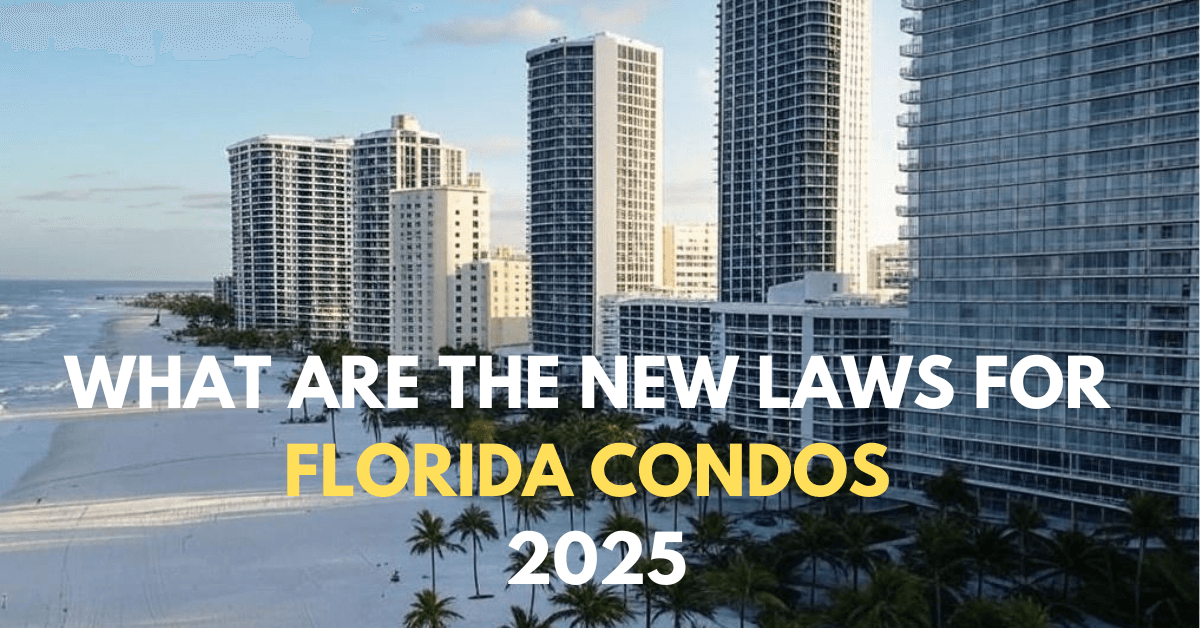In response to growing concerns about the structural integrity of aging condominium and cooperative buildings, the Florida Condo Law has undergone significant changes to ensure resident safety. Senate Bill 4-D (2022) and Senate Bill 154 (2023) introduce comprehensive requirements for building inspections and reserve funding.
Florida Condo Law Senate Bill 4-D (2022): Establishing Milestone Inspections
Following the tragic collapse of the Champlain Towers South in Surfside, Florida’s legislature acted swiftly by passing Senate Bill 4-D during a special session.
SB 4-D mandates “milestone inspections” for condominium and cooperative buildings that are three or more stories high. Key provisions include:
- Inspection Timeline:
- Buildings 30 years old must undergo an inspection and every 10 years thereafter.
- Buildings within three miles of a coastline require inspection at 25 years of age and every 10 years thereafter.
- Initial Inspection Deadline:
- Buildings with a certificate of occupancy issued on or before July 1, 1992, must complete their first inspection by December 31, 2024.
- Inspection Phases:
- Phase One: A visual examination to identify signs of structural distress.
- Phase Two: Conducted if Phase One reveals substantial structural deterioration, involving a more detailed assessment.
- Reporting:
- Inspection reports must be submitted to local building officials and the respective associations.
- Summaries are to be distributed to unit owners via mail and email (with consent).
- Official Records Access:
- Unit owners and renters gain the right to inspect milestone inspection reports and related structural or life safety reports.
- Developer Turnover Inspections:
- Developers are required to provide turnover inspection reports that comply with milestone inspection standards when control of the association transitions to unit owners.
These measures aim to proactively identify and address structural issues, thereby preventing potential hazards.
Florida Condo Law Senate Bill 154 (2023): Refining Inspection and Reserve Requirements
Building upon SB 4-D, SB 154 introduces refinements to the inspection process and reserve funding:
- Scope of Inspections:
- Clarifies that milestone inspections apply to buildings with residential condominiums or cooperatives, including mixed-ownership structures.
- All owners in mixed-ownership buildings share responsibility for compliance and inspection costs.
- Inspection Deadlines:
- Buildings reaching 30 years of age before December 31, 2024, must complete inspections by that date.
- The 25-year inspection requirement for buildings within three miles of the coastline is removed; however, local enforcement agencies may impose such requirements based on environmental conditions.
- Extensions and Previous Inspections:
- Local enforcement agencies can grant deadline extensions upon showing good cause.
- Inspections conducted before July 1, 2022, may be accepted if they substantially comply with current requirements.
- Reserve Funding:
- Associations must base budgets adopted on or after January 1, 2025, on the findings of the most recent Structural Integrity Reserve Study (SIRS).
- Reserves are required for items the association is responsible for, as specified in the condominium declaration.
- Items with an estimated remaining useful life over 25 years do not require reserve funding, though deferred maintenance expenses may be recommended.
- Exemptions and Waivers:
- Certain buildings, such as single-family dwellings with three or fewer stories, are exempt from SIRS requirements.
- Associations not subject to SIRS can waive reserves with majority approval from total voting interests.
- Professional Qualifications:
- The visual inspection portion of SIRS can be conducted by certified reserve specialists or professional reserve analysts, in addition to engineers and architects.
These refinements aim to enhance clarity, ensure appropriate reserve funding, and provide flexibility based on specific building conditions.
Implications for Residents and Associations
Florida Condo Law measures underscore Florida’s commitment to building safety, particularly for structures exposed to environmental stressors like coastal conditions.
- For Residents:
- Increased access to inspection reports enhances transparency regarding building conditions.
- Improved safety measures contribute to peace of mind.
- For Associations:
- Clear guidelines facilitate compliance with safety standards.
- Structured reserve funding ensures financial preparedness for necessary repairs and maintenance.
By implementing Florida Condo Law, Florida aims to prevent tragedies resulting from structural failures, promoting the well-being of its residents and the longevity of its buildings.
For more detailed information, refer to the official Florida Senate bill summaries:




